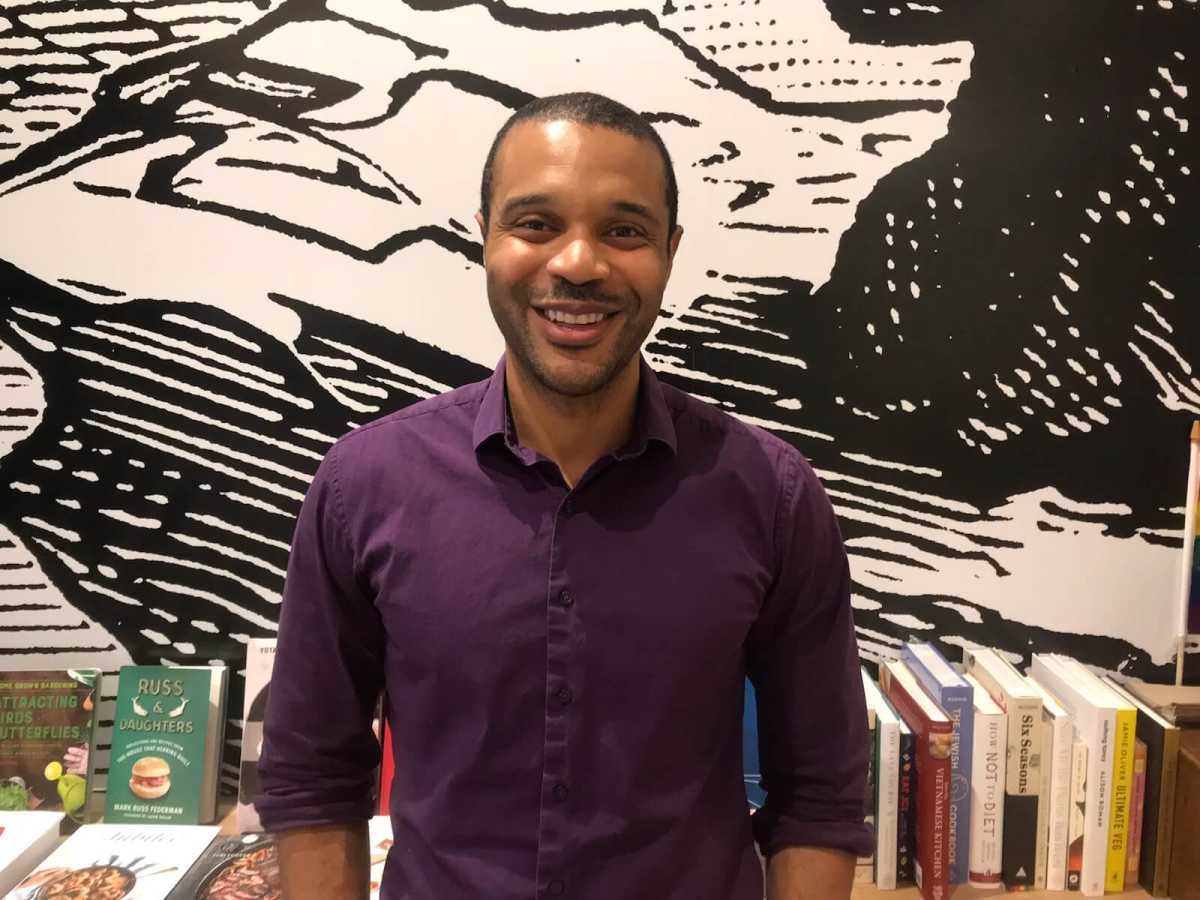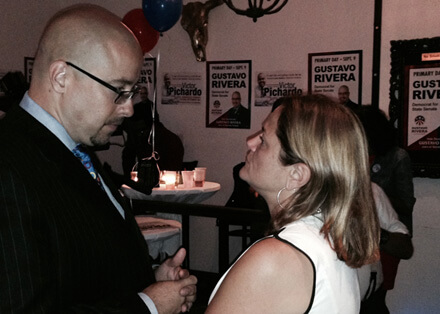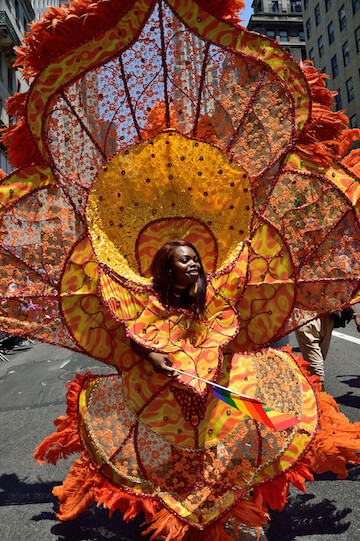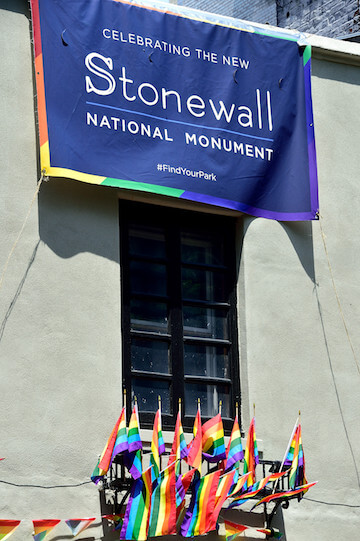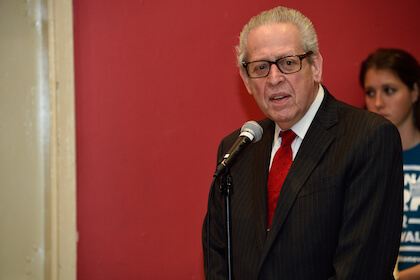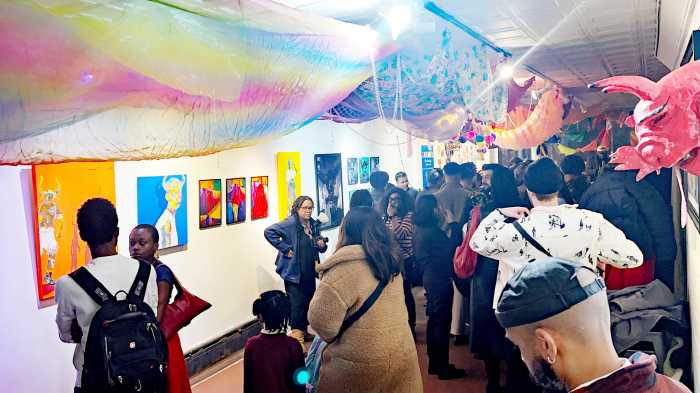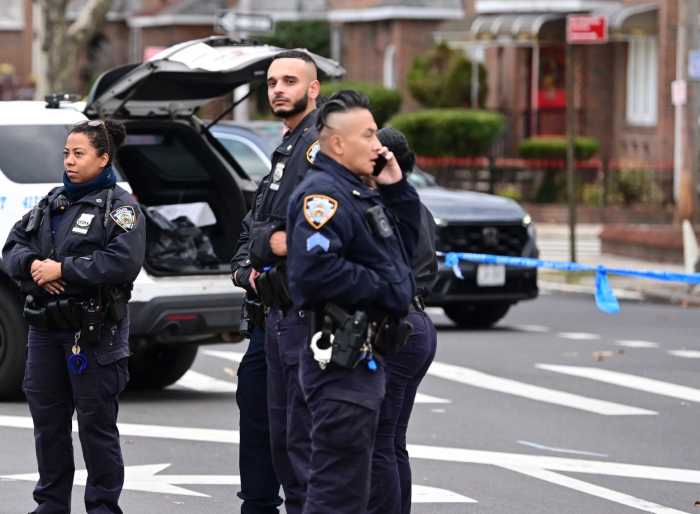Up until the very moment his interview with Gay City News took place, out gay Brooklyn State Senate candidate Jabari Brisport was plugging away at numbers on his laptop. But the 32-year-old Democratic Socialist of America-endorsed progressive wasn’t crunching data for his campaign.
He was working overtime for his students.
Brisport spends his days as a public school math teacher at Medgar Evers College Preparatory School, and after the final bell he morphs into an energetic political candidate hungry to take on the most pressing issues facing working class communities in the 25th State Senate District, which encompasses all or parts of Fort Greene, Boerum Hill, Red Hook, Bedford-Stuyvesant, Sunset Park, Gowanus, and Park Slope. He’s running an historic campaign — he would be the first out LGBTQ Black member of the State Legislature — on a platform dedicated to strengthening public schools, addressing gentrification and homelessness, implementing single-payer healthcare, fully decriminalizing sex work, maintaining bail reform advances, and legalizing marijuana — that last in a way that prioritizes the communities of color that have long been on the losing end of the war on drugs. Those are among the progressive ideas Brisport emphasizes most.
And at a time when at least one billionaire is pumping hundreds of millions of his own dollars into a political campaign, Brisport is positioning himself as the antidote to that: He says he isn’t taking corporate donations or cash from real estate developers, landlords, lobbyists, charter schools, or the fossil fuel industry.
It’s Brisport’s second go-around on the political circuit after mounting an unsuccessful general election bid for City Council in 2017 against incumbent City Councilmember Laurie Cumbo, though he still managed to snag more than 9,300 votes as a Green Party candidate.
This time around, Brisport isn’t facing an incumbent. The current state senator representing that district, Velmanette Montgomery, is retiring after her term to close out more than three decades in office, setting up a wide open primary. Brisport’s main competitors in the race include Jason Salmon, a former aide to Montgomery, and State Assemblymember Tremaine Wright.
“I’m a working class candidate,” Brisport said during an interview with Gay City News at the Center for Fiction in Fort Greene. “I wake up every morning at 5:30 and I’m out the door by 7 a.m. to make sure our students have the best possible education they can get. I go in there knowing they may be housing-unstable or haven’t eaten breakfast that day, or they might have a home that they don’t feel loved in.”
After work is over, his night job begins. Brisport is a part of a wave of progressive politicians who were inspired by Vermont Senator Bernie Sanders’ 2016 insurgent campaign for president when he emerged as a formidable challenger to former Secretary of State Hillary Clinton and won 23 contests on a platform that, even in defeat, prioritized social justice issues and helped move the Democratic Party to the left. Brisport was front-and-center during the aftermath of the 2016 election, working alongside Alexandria Ocasio-Cortez to help her clinch an astonishing upset victory over Queens Democratic Party boss Joe Crowley in the NY-14 Democratic primary.
“I am a Democratic Socialist because of Bernie Sanders,” Brisport said. “I knew America was racist but I didn’t realize that capitalism and race were so intertwined until 2016 when it dawned on me that capitalism is why people were brought to the United States as capital and sold on open markets as a commodity, and I realized that capitalism commodifies things that shouldn’t be commodified. How do you put a price tag on insulin if you’re a diabetic?”
There are reasons why ideas in Brisport’s wing of the party are gaining traction. Both Obamacare and employer-sponsored private healthcare plans are often so expensive that individuals are resorting to online fundraisers to pay for routine procedures or life-saving medical needs; public schools are gasping for air in the face of funding shortages; and rent costs make it difficult or impossible for many to make ends meet, especially for individuals saddled with tens of thousands — or hundreds of thousands — in student loan debt.
Should he be elected, Brisport plans to be a champion for a broad slate of initiatives including the New York Health Act, which is the state-specific version of single-payer, and he is stressing the important role that system would play in bolstering HIV/ AIDS-related treatment and prevention and providing gender-affirming care. In the area of housing, he supports Brooklyn Senator Julia Salazar’s Good Cause bill that would limit rent hikes in unregulated units and place certain restrictions on landlords trying to evict tenants.
Brisport is also prioritizing education because he has first-hand insight into the realities public schools face when they are cash-strapped.
“My stance on charter schools is pretty cut and dry,” Brisport explained. “I’m a union public school teacher. I see charter schools for what they are, which are an attempt to drain funding away from our public school system slowly but surely to make it privatized even further. It’s a conservative tactic that has been done for decades.”
Brisport’s activism took off more than a decade ago when he immersed himself in the fight for marriage equality in New York. He recalls dialing his state legislators and encouraging all of his friends to do the same when the fight was ramping up in Albany in 2009. He said his own identity as a second-class citizen drove him to play a role in that fight.`
During this interview, Brisport often returned to that point — that he has felt like a second-class citizen — and it’s especially significant because his intersectional identity as a gay Black man is not lost on him as he pursues a campaign that could serve as a groundbreaking model for other Black queer folks who aspire to elevate themselves to public office.
“There are still so many Black spaces that are still homophobic and queer spaces that are still racist,” Brisport said. “As a queer person and as a Black person, you spend a lot more time navigating where you belong and spend a lot more time fighting for your right to exist in spaces. Fighting for your own rights makes it much, much easier to fight for others because you’ve been there and you know what it’s like.”
From this perspective, it makes sense that Brisport focuses on queer issues through a working class lens. He is not yet committed to a side on the contested question of legalizing compensated gestational surrogacy, which has been held up in the State Legislature by out lesbian Assemblymember Deborah Glick and others over concerns about the health of women carrying the babies and those who donate their eggs. Gestational surrogacy is an option most easily available to prospective parents with the means to put tens of thousands of dollars into this approach to building a family.
“I want to make sure everyone has a fair seat at the table, not just the person with the most money,” Brisport said. “I am still listening to both sides of the argument; it’s a very sensitive issue and I want to make sure we get it right.”
Brisport offered a passionate endorsement of the DecrimNY coalition and the Walking While Trans coalition, which are two similar efforts focused on improving the lives of marginalized sex workers, many of whom are transgender, as well as other trans women who may be profiled as sex workers.
The housing insecurity and other financial woes that many sex workers and transgender women face provided the connections for Brisport to relate to their daily anxieties.
“When I first came out, my dad spent a few days trying to convince me I wasn’t gay,” he said. “I just kind of shut up and didn’t talk about it for a few more years. I went back in the closet for a few years. I was 15. I didn’t come back out until I was almost in college… I think of the trauma of the young girl who comes out and is not only rejected, but loses her home. Queer issues permeate everything in my campaign.”
Brisport backs that point up with diverse leadership teams on the campaigns he has waged. His current campaign manager, Fainan Lakha, is a transgender woman of color, and his 2017 campaign manager, Virginia “Vigie” Ramos Rios, went on to run Ocasio-Cortez’s 2018 campaign — thanks to Brisport.
“Vigie became a Campaign Manager through an unconventional path,” Ocasio-Cortez tweeted less than a month before her primary election victory in 2018. “NYC politics is NOT A NICE PLACE for women & gender non-conforming people. Allies like @JabariBrisport created space for Vigie. When I started to run, Jabari brought us together. (I can’t thank him enough!)”
Looking to his second election bid, Brisport sees a brighter outlook. His team, he said, is bigger than the one he had for his City Council run and his field operation will have been underway for seven to eight months before the June primary. In comparison, his City Council campaign only started knocking on doors two months before voters went to the polls. He has drawn 1,000 contributions totaling $44,953 so far, according to state campaign finance data.
“We are having canvasses every other day,” he said. “We believe in our message and we’re ready to fight hard and win.”
Like his idol Bernie Sanders, Brisport hopes his second campaign builds on the one he ran a few years ago. That has — at least so far — been the case for Sanders. Will Brisport have the same fate? Voters will answer that question in the Democratic Primary on June 23.

